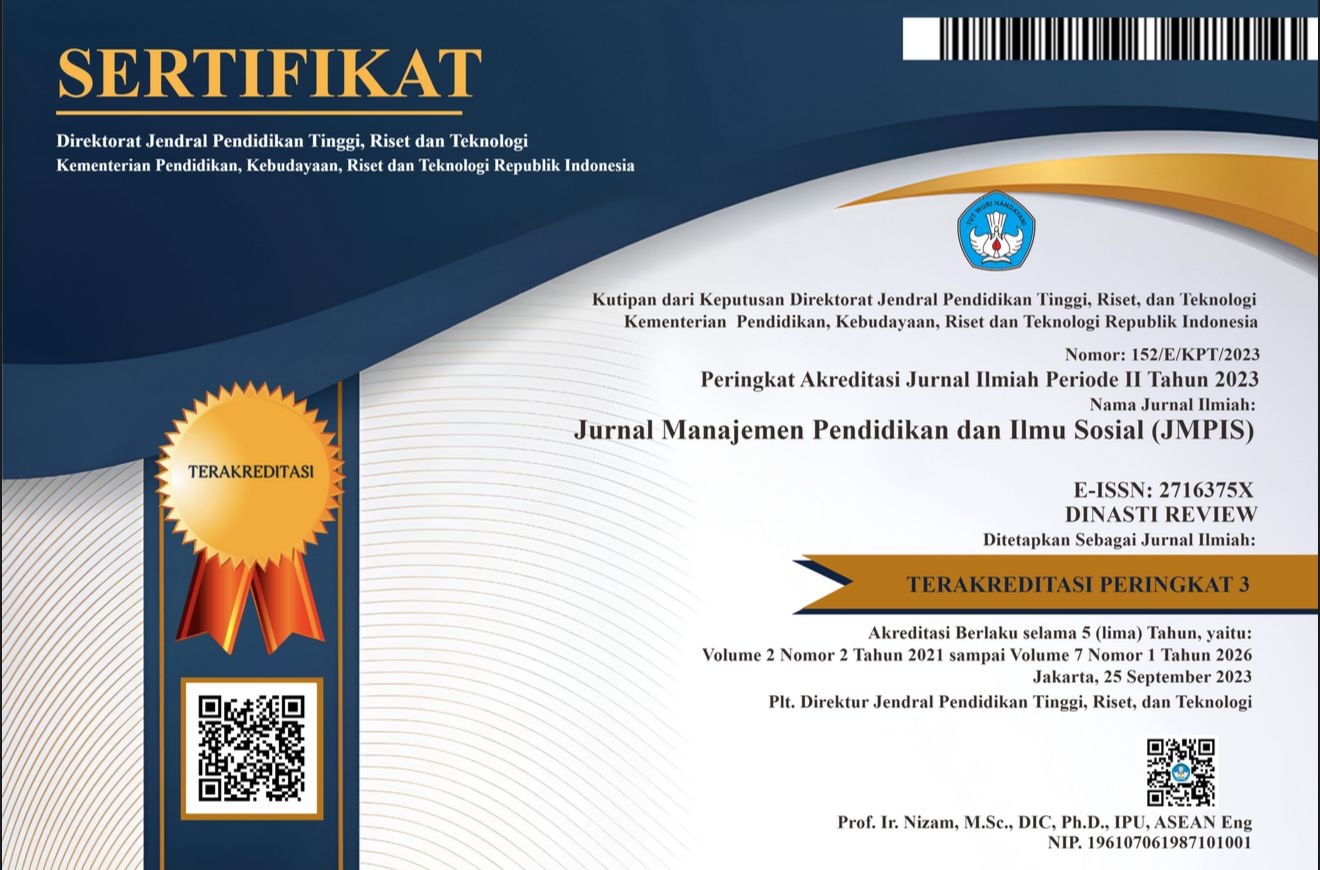Strategi Penerapan Program Sekolah Pencetak Wirausaha Terhadap Peningkatan Minat Berwirausaha Siswa SMK
DOI:
https://doi.org/10.38035/jmpis.v6i4.4970Keywords:
Pendidikan Vokasi, Sekolah Pencetak Wirausaha, Minat Berwirausaha, SMKAbstract
Pendidikan vokasi memiliki peran penting dalam membentuk tenaga kerja yang kompetitif dan sekaligus menumbuhkan jiwa kewirausahaan di kalangan generasi muda. Salah satu upaya yang dilakukan adalah penerapan Program Sekolah Pencetak Wirausaha (PSPW), yang bertujuan untuk membekali siswa dengan keterampilan bisnis dan manajerial guna mendorong mereka menciptakan peluang usaha sendiri. Meskipun program ini telah diterapkan di berbagai sekolah, tantangan dalam meningkatkan minat kewirausahaan siswa masih menjadi kendala utama. Penelitian ini bertujuan untuk menganalisis strategi penerapan PSPW di SMKN PP dan SMK Assulaimaniyyah Kabupaten Cianjur serta mengevaluasi dampaknya terhadap peningkatan minat berwirausaha siswa. Metode yang digunakan dalam penelitian ini adalah studi kasus dengan pendekatan kualitatif. Teknik pengumpulan data yang diterapkan meliputi wawancara mendalam, observasi partisipatif, dan studi dokumentasi. Sumber data penelitian terdiri dari kepala sekolah, guru pembimbing kewirausahaan, siswa peserta PSPW, serta pihak-pihak terkait lainnya yang mendukung program ini. Hasil penelitian menunjukkan bahwa PSPW berkontribusi signifikan dalam meningkatkan keterampilan serta kepercayaan diri siswa dalam berwirausaha. Namun, program ini masih menghadapi berbagai tantangan, seperti keterbatasan modal, akses pasar yang terbatas, kurangnya keterlibatan dunia industri, dan dukungan orang tua yang belum optimal. Kesimpulan dari penelitian ini menegaskan bahwa PSPW memiliki potensi besar dalam menciptakan wirausahawan muda yang mandiri. Untuk meningkatkan efektivitasnya, diperlukan strategi penguatan, seperti peningkatan akses modal, optimalisasi pemasaran digital, serta kolaborasi yang lebih erat antara sekolah, dunia industri, dan pemerintah untuk mendukung keberlanjutan program ini.
References
Adrias, & Ruswandi, A. (2025). Desain Penelitian Kuantitatif, Kualitatif, dan Mix Method. Rajawali Pers.
Agussalim, A., Mukhlis, I., Rohayati, S., Wahyuni, W., & Said, S. (2024). UNEMPLOYMENT OF VOCATIONAL HIGH SCHOOL GRADUATES: THE EFFECT OF WORK SKILLS, FAMILY SOCIO-ECONOMIC STATUS, AND ENTREPRENEURIAL ATTITUDES ON WORK READINESS. JURNAL EKONOMI PENDIDIKAN DAN KEWIRAUSAHAAN, 12(2), 187–204.
Bourgeois, A. (2011). Entrepreneurship Education at School in Europe: National Strategies, Curricula and Learning Outcomes. ERIC.
BPS. (2024). Unemployment Rate by Education Level - Statistical Data - BPS. BPS. https://www.bps.go.id/en/statistics-table/2/MTE3OSMy/unemployment-rate-by-education-level.html
Chaffey, D., Ellis-Chadwick, F., & Mayer, R. (2009). Internet marketing: strategy, implementation and practice. Pearson education.
Chell, E. (2013). Review of skill and the entrepreneurial process. International Journal of Entrepreneurial Behavior & Research, 19(1), 6–31.
Cohen, L., Manion, L., & Morrison, K. (2018). Research Methods in Education (Eighth edi). Routledge.
Creswell, J. W., & Guetterman, T. C. (2019). EDUCATIONAL RESEARCH: PLANNING, CONDUCTING, AND EVALUATING QUANTITATIVE AND QUALITATIVE RESEARCH (Sixth Edit). Pearson Education, Inc.
Fraenkel, J. R., Wallen, E. N., & Hyun, H. H. (2012). How to Design and Evaluate Research in Education (Eight Edit). McGraw-Hil.
Gibb, A. A. (1993). Enterprise culture and education: Understanding enterprise education and its links with small business, entrepreneurship and wider educational goals. International Small Business Journal, 11(3), 11–34.
Hapuk, M. S. K., Suwatno, S., & Machmud, A. (2020). Efikasi diri dan motivasi: sebagai mediasi pengaruh pendidikan kewirausahaan terhadap minat berwirausaha.
Hisrich, R. D., & Shepherd, D. A. (2017). Entrepreneurship. McGraw-Hill Education.
Imantoro, L. W. (2024). Unemployment among the Young Generation. Pratama Institute. https://pratamainstitute.com/en/unemployment-among-the-young-generation
Kisno, K., Milfayetty, S., Sitanggang, N., & Lubis, M. J. (2023). The System Approach for Entrepreneurship-Based School Management in Vocational High Schools. AL-ISHLAH: Jurnal Pendidikan.
Kolb, D. A. (2014). Experiential learning: Experience as the source of learning and development. FT press.
Lodico, M. G., Spaulding, D. T., & Voegtle, K. H. (2006). METHODS IN EDUCATIONAL RESEARCH: FROM THEORY TO PRACTICE. Jossey-Bass.
Martin, B. C., McNally, J. J., & Kay, M. J. (2013). Examining the formation of human capital in entrepreneurship: A meta-analysis of entrepreneurship education outcomes. Journal of Business Venturing, 28(2), 211–224.
Nabi, G., Liñán, F., Fayolle, A., Krueger, N., & Walmsley, A. (2017). The impact of entrepreneurship education in higher education: A systematic review and research agenda. Academy of Management Learning & Education, 16(2), 277–299. https://doi.org/https://doi.org/10.5465/amle.2015.0026
Patton, M. Q. (2014). Qualitative research & evaluation methods: Integrating theory and practice. Sage publications.
Pittaway, L., & Cope, J. (2007). Simulating entrepreneurial learning: Integrating experiential and collaborative approaches to learning. Management Learning, 38(2), 211–233.
R?dulescu, C., Burlacu, S., Bodislav, D., & Bran, F. (2020). Entrepreneurial Education in the Context of the Imperative Development of Sustainable Business.
Rae, D. (2006). Entrepreneurial learning: A conceptual framework for technology-based enterprise. Technology Analysis & Strategic Management, 18(1), 39–56. https://doi.org/10.1080/09537320500520494
Rofiaty, R. (2019). The relational model of entrepreneurship and knowledge management toward innovation, strategy implementation and improving Islamic boarding school performance. Journal of Modelling in Management.
Schumpeter, J. (1934). The theory of economic development Harvard University Press. Cambridge, MA.
Sugiyono. (2018). Metode Penelitian Kuantitatif, Kualitatif dan R&D. Alfabeta.
Downloads
Published
How to Cite
Issue
Section
License
Copyright (c) 2025 Chepi Septiana Muharam, Eva Dianawati Wasliman

This work is licensed under a Creative Commons Attribution 4.0 International License.
Hak cipta :
Penulis yang mempublikasikan manuskripnya di jurnal ini menyetujui ketentuan berikut:
- Hak cipta pada setiap artikel adalah milik penulis.
- Penulis mengakui bahwa Jurnal Manajemen Pendidikan dan Ilmu Sosial (JMPIS) berhak menjadi yang pertama menerbitkan dengan lisensi Creative Commons Attribution 4.0 International (Attribution 4.0 International CC BY 4.0) .
- Penulis dapat mengirimkan artikel secara terpisah, mengatur distribusi non-eksklusif manuskrip yang telah diterbitkan dalam jurnal ini ke versi lain (misalnya, dikirim ke repositori institusi penulis, publikasi ke dalam buku, dll.), dengan mengakui bahwa manuskrip telah diterbitkan pertama kali di Jurnal Manajemen Pendidikan dan Ilmu Sosial (JMPIS).











































































